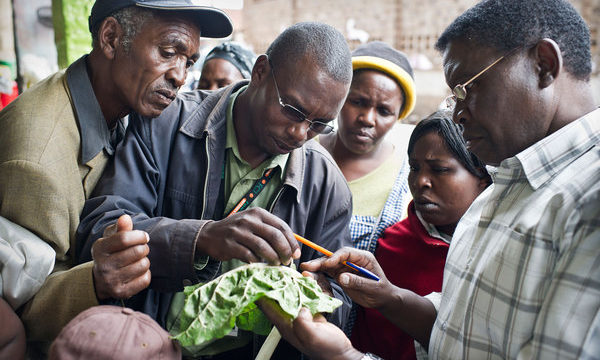Pecan scab, caused by the fungus Fusicladium effusum, is a major yield-limiting disease of pecan (Carya illinoinensis). Planting varieties with some resistance to the disease is the most practical way to avoid losses from pecan scab, but the scab fungus can change over time to overcome host resistance. The use of chemical fungicides is another widely used method of prevention and control. However, increasing resistance of the scab fungus to fungicides, coupled with greater awareness of the environmental impact of chemicals, is prompting farmers to consider other management options.
One such method is the use of naturally occurring antimicrobial compounds produced by bacteria living in the guts of very small worm-like animals called nematodes. The beneficial bacteria found in these nematodes can be harvested and cultured for the antimicrobial compounds they produce.
Now, scientists from the US Department of Agriculture’s Agricultural Research Service (USDA-ARS) have identified which of the naturally occurring compounds are most effective in controlling pecan scab. The team of 4 scientists (a chemist, an entomologist and 2 plant pathologists) analysed the compounds produced by 2 different bacterial genera, Xenorhabdus from Steinernema nematodes, and Photorhabdus from Heterorhabditis nematodes. The team assessed the toxicity of these compounds to the pecan scab fungus F. effusum. They found that the metabolite responsible for the highest toxicity was trans-cinnamic acid (TCA). Further tests confirmed the toxicity of TCA to the pecan scab fungus and revealed that this metabolite can stop growth of the fungus at concentrations of just 64 μg mL−1, in other words with just 0.000064g of TCA per mL of media.
The results of this research could help in the development of effective natural antimicrobial products with a lower risk of fungicide resistance and fewer impacts on the environment compared to conventional fungicides.
Reference:
Bock CH, Shapiro-Ilan DI, Wedge DE and Cantrell, CL (2014) Identification of the antifungal compound, trans-cinnamic acid, produced by Photorhabdus luminescens, a potential biopesticide against pecan scab. Journal of Pest Science 87 (1) pp. 155-162.
1 Comment
Leave a Reply
Related News & Blogs
How Plantwise plant clinics supported a women-led cottage industry in India
Women preparing biopesticides at a cottage industry. (Photo: MSSRF, Tamil Nadu, India) In 2003, twelve women in Chokkalingam Puddur village started a local biocontrol agent production unit. The Ellya Thendral women self-help group produced and marketed…
31 March 2022



[…] Alternative to fungicides for the control of Pecan scab […]